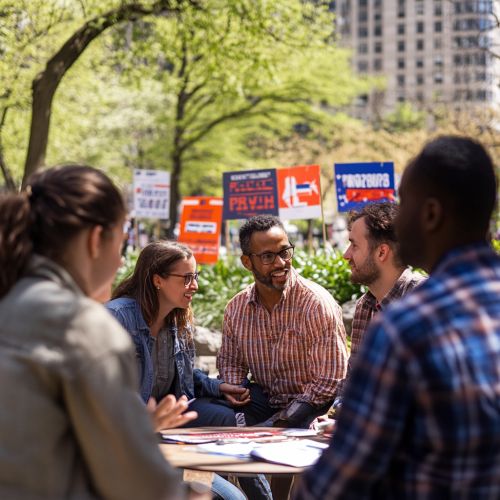Third party (United States): Difference between revisions
(Created page with "== Introduction == In the United States, a third party is any political party that competes alongside the two dominant parties, the Democratic and Republican parties. Third parties have historically played a significant role in American politics, often influencing major party platforms and introducing new ideas and policies. Despite their impact, third parties face numerous challenges, includi...") |
No edit summary |
||
| Line 23: | Line 23: | ||
In more recent decades, third parties such as the [[Green Party of the United States|Green Party]] and the [[Libertarian Party (United States)|Libertarian Party]] have gained attention for their advocacy of environmental issues and individual liberties, respectively. While these parties have struggled to win major elections, they have influenced the national conversation on key issues. | In more recent decades, third parties such as the [[Green Party of the United States|Green Party]] and the [[Libertarian Party (United States)|Libertarian Party]] have gained attention for their advocacy of environmental issues and individual liberties, respectively. While these parties have struggled to win major elections, they have influenced the national conversation on key issues. | ||
[[Image:Detail-99477.jpg|thumb|center|A diverse group of people engaging in a political discussion in a public park, with campaign signs for various third parties visible in the background.|class=only_on_mobile]] | |||
[[Image:Detail-99478.jpg|thumb|center|A diverse group of people engaging in a political discussion in a public park, with campaign signs for various third parties visible in the background.|class=only_on_desktop]] | |||
== Challenges Facing Third Parties == | == Challenges Facing Third Parties == | ||
Latest revision as of 12:20, 30 October 2024
Introduction
In the United States, a third party is any political party that competes alongside the two dominant parties, the Democratic and Republican parties. Third parties have historically played a significant role in American politics, often influencing major party platforms and introducing new ideas and policies. Despite their impact, third parties face numerous challenges, including electoral barriers and limited media coverage, which hinder their ability to compete effectively in elections.
Historical Overview
Early Third Parties
The concept of third parties in the United States dates back to the early 19th century. One of the first significant third parties was the Anti-Masonic Party, established in the 1820s. This party was founded in opposition to the perceived influence of Freemasonry in politics. The Anti-Masonic Party was notable for being the first to hold a national nominating convention, a practice later adopted by the major parties.
Another early third party was the Liberty Party, formed in the 1840s with the primary goal of abolishing slavery. Although it never gained significant electoral success, the Liberty Party helped to bring the issue of slavery to the forefront of national politics, influencing the platforms of larger parties.
The Rise of the Populist and Progressive Movements
In the late 19th and early 20th centuries, the Populist and Progressive movements emerged as influential third-party forces. The Populist Party, also known as the People's Party, was founded in 1891 to represent the interests of farmers and laborers against the economic elite. It advocated for policies such as the direct election of senators and the regulation of railroads.
The Progressive Party, led by former President Theodore Roosevelt, was established in 1912 after a split in the Republican Party. The Progressives championed reforms such as women's suffrage, labor rights, and the regulation of monopolies. Roosevelt's candidacy in the 1912 presidential election was one of the most successful third-party bids in U.S. history, as he garnered 27% of the popular vote.
Mid-20th Century and Beyond
The mid-20th century saw the emergence of several notable third parties, including the States' Rights Democratic Party, commonly known as the Dixiecrats, which formed in 1948 in opposition to the Democratic Party's civil rights platform. The American Independent Party, founded by George Wallace in 1968, also focused on states' rights and segregationist policies.
In more recent decades, third parties such as the Green Party and the Libertarian Party have gained attention for their advocacy of environmental issues and individual liberties, respectively. While these parties have struggled to win major elections, they have influenced the national conversation on key issues.


Challenges Facing Third Parties
Electoral System Barriers
One of the primary challenges facing third parties in the United States is the first-past-the-post electoral system, which tends to favor a two-party system. In this system, the candidate with the most votes wins, making it difficult for third-party candidates to gain traction unless they can secure a plurality of votes. This often leads to the spoiler effect, where third-party candidates draw votes away from major party candidates, potentially altering the outcome of an election.
Ballot Access and Funding
Third parties also face significant hurdles in gaining ballot access. Each state has its own requirements for third-party candidates to appear on the ballot, often involving complex petition processes and high signature thresholds. Additionally, third parties struggle to compete financially with the major parties, as they receive less funding from donors and have limited access to public campaign financing.
Media Coverage and Public Perception
The media plays a crucial role in shaping public perception of political parties. Third parties often receive less media coverage than their major party counterparts, making it challenging to reach a broad audience. This lack of visibility can perpetuate the perception that third parties are not viable options, further discouraging voters from supporting them.
Impact and Influence of Third Parties
Despite the challenges they face, third parties have made significant contributions to American politics. They have often served as catalysts for change, introducing new ideas and policies that are later adopted by the major parties. For example, the Progressive Era reforms, such as the direct election of senators and women's suffrage, were initially championed by third parties before being embraced by the major parties.
Third parties also play a critical role in representing diverse viewpoints and interests that may not be adequately addressed by the major parties. They provide an outlet for political expression and can influence the national conversation on important issues, such as environmental protection, civil liberties, and economic inequality.
Notable Third Parties and Figures
Libertarian Party
The Libertarian Party, founded in 1971, is one of the most enduring third parties in the United States. It advocates for minimal government intervention in both personal and economic matters, emphasizing individual liberty and free markets. The party has fielded candidates in numerous elections, with Gary Johnson's 2016 presidential campaign achieving the highest vote total for a Libertarian candidate in history.
Green Party
The Green Party, established in 1984, focuses on environmental issues, social justice, and grassroots democracy. It gained national attention with Ralph Nader's presidential campaigns in 1996 and 2000. The Green Party has been instrumental in raising awareness about climate change and advocating for sustainable policies.
Reform Party
The Reform Party was founded in 1995 by Ross Perot, a businessman who ran as an independent candidate in the 1992 presidential election. The party emphasizes government reform, fiscal responsibility, and political accountability. Perot's 1992 campaign was one of the most successful third-party bids in modern history, capturing 19% of the popular vote.
Conclusion
Third parties in the United States have played a vital role in shaping the political landscape, despite the significant challenges they face. They have introduced new ideas, influenced major party platforms, and provided a voice for diverse perspectives. While the electoral system and other barriers continue to limit their success, third parties remain an essential component of American democracy.
